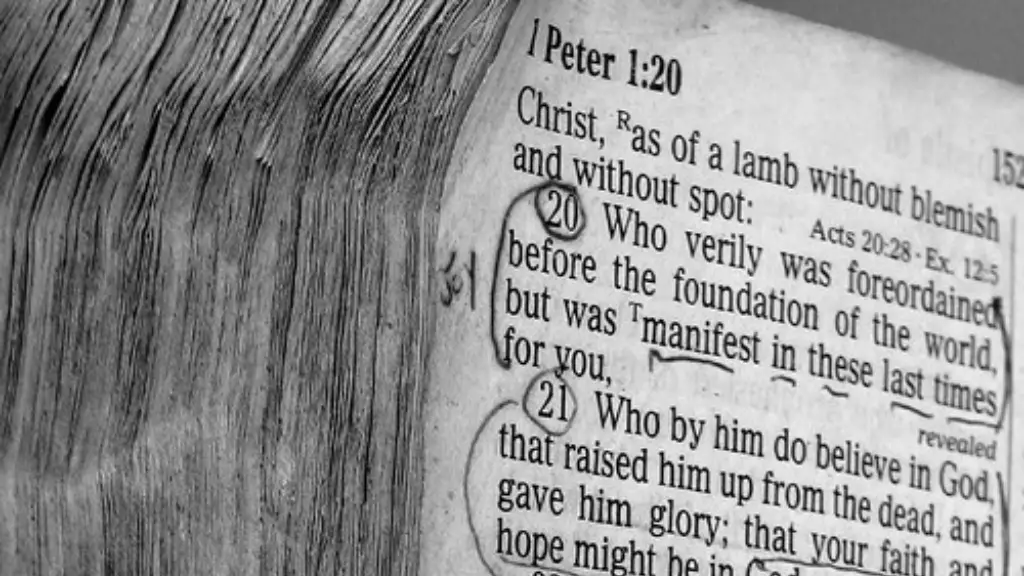As with any controversial topics, the Bible’s stance on abortions is a divisive one. Any religious interpretation of the Bible is shrouded in both opinion and tradition and there are a number of interpretations, ranging from outright prohibition to acceptance of the practice with limitations. To answer the question ‘Does the Bible say anything about abortions?’, it’s not enough to simply look at various verses of the Bible and draw conclusions. To explore the text in its entirety requires a critical and comprehensive analysis of understanding and context.
The Bible does not explicitly talk about abortion in any of its verses. However, the principle of ‘Thou shalt not kill’ does imply some aspects of opposition due to the ethical and moral considerations of an unborn child. As Christians, it is considered a mandate to protect life at all stages. According to John Paul the Great, “the human being is to be respected and treated as a person from the moment of conception”.
In addition, the Bible reflects a general sympathy and respect towards women in difficult situations and encourages compassion, as well as justice. The Bible is emphatic on the fact that a life is a sacred gift created by God and should be protected and respected. Christianity also encourages personal freedom and enables individuals to seek guidance and make informed decisions by themselves.
Though opinion remains deeply divided on the issue, this presupposition is the basis of much contemporary discussion and analysis. One perspective argues that the Bible commands us to show respect and compassion to an unborn child, and thus condemns abortion. Conversely, the other perspective states that the Bible respects the freedom of choice and relies more on ethical judgement, and so allows for individuals to make their own decisions about abortion.
In the case of difficult pregnancies, although the Bible does not approve of abortion, it does not condemn the practice either. Most religious scholars agree that the Bible does not mention the fetus in any substantial way, but instead talks about respect for freedom and ethical judgement. Therefore, in cases such as rape, incest, or danger to the mother’s life, it is seen that the Bible allows for abortions to occur in such extreme cases.
Despite the lack of Biblical support, religious groups such as the Catholic Church have strongly opposed the practice of abortion. This position is based on the fact that life is created with a purpose and divine intervention, and thus abortion is seen as an affront to the will of God. Although religious entities still have strong sway in society, their political power is beginning to weaken in the 21st century.
To conclude, while there is no clear stance on abortion in the Bible, it can be interpreted as an issue of moral judgement relying on respect for the freedom of choice. Many religious groups still use the Bible to influence public opinion, but more often than not such opinions are personal and rely on one’s interpretation of the text.
Does Abortion Violate Religious Freedom?
When talking about abortion, the focus is often on the moral and ethical considerations of taking an unborn life. However, in countries where some form of abortion is permissible by law, there is a second major consideration often overlooked – the violation of religious beliefs.
Religious freedom is a right enshrined in many constitutions, and a prominent example is the 1st Amendment to the United States Constitution which guarantees freedom of religion. This right is further stressed by international human rights laws, such as the Universal Declaration of Human Rights which states in Article 18: “everyone has the right to freedom of thought, conscience, and religion.”
Therefore, the issue of abortion is not just a moral one, but also a right to religious freedom. Any laws on the subject of abortion can be seen as a violation of this right, as legislation on abortion often does not take into account each individual’s beliefs on the matter. Individuals can be legally forced to act against their religious beliefs and convictions, a restriction that should not be imposed on any section of the population.
Furthermore, such laws can lead to discrimination against certain religious beliefs. For example, a law permitting some abortions could lead to mistreatment of religious groups opposing abortion, such as the Catholic Church, in favor of groups approving of abortion in some sense, such as some secular or progressive religious organizations. This is a genuine threat to the right to freedom of thought, conscience and belief.
To conclude, when discussing the moral implications of abortions, the topic of religious freedom has to be taken into account. Any laws on abortion which do not consider all religious beliefs leads to a violation of a fundamental human right and can be seen as unjust.
What Are The Moral Considerations of Abortions?
The moral considerations surrounding abortion are highly subjective and often determined by one’s religious and personal beliefs. Depending on perspective, morality can be seen as imparting an absolute ban on abortion or a more practical approach in the context of certain circumstances.
The moral argument against abortion is mainly derived from religious belief, usually stemming from the ‘Thou shalt not kill’ commandment. This creates a moral inhibition on abortion by stressing the sanctity of life and respect for the unborn. For many, this is further popularised by the idea that life is created by God and that it should be protected at all costs.
Other perspectives allow for abortion in certain circumstances, such as rape, incest, endangerment to the mother’s life, or non-viability of the foetus. This argument is based on the idea of ethical judgement which is often derived from one’s religious background. It is thought that the best way to handle such a moral dilemma is to remove it from the abortion debate and leave it for the individual’s judgement.
Ultimately, people’s opinions on abortion remain divided, ranging from outright prohibition to acceptance of the practice. What is clear however is that any decision about abortion should not be based on religion alone, but instead on one’s own moral judgement in context.
What Laws Around The World Exist On Abortion?
Abortion laws vary greatly around the world, especially when considering both developed and developing countries. On the whole, abortion laws tend to be more relaxed in developed countries and more strict in underdeveloped countries.
In many countries, some forms of abortion are illegal and punishable under law, with punishments ranging from hefty fines to prison sentences and even the death penalty. For example, in El Salvador, Hindustan, Nicaragua, and Malta abortion is illegal in all circumstances and can lead to a life sentence.
Other states have restrictions on abortion, with some allowing it in the case of rape, while others restrict it to danger to the mother’s life. There are some countries however with relaxed laws on the issue, such as Canada and U.S. which have laws permitting abortion in most cases.
The laws surrounding abortion tend to favor the right of choice and protection of the mother’s life. On the whole, these laws reflect the changing social practices of the times and react accordingly.
What Are The Alternatives To Abortions?
Abortion is a controversial and sensitive subject and for many, the solution is not about terminating the developing baby, but rather about engaging in other methods that avoid it. This can be achieved through various forms of contraception, and there is an array of contraceptive methods varying from temporary to permanent.
The most popular forms of contraception are the use of condoms, birth control pills, IUDs and implants. These are considered to be the most effective and safest methods for women who wish to avoid pregnancy. For those who do not want to rely on traditional methods, there is also the option of natural family planning, which involves monitoring ovulation and sexual abstinence during the fertile period.
In addition, adoption is another viable solution to pre-birth pregnancies, offering the mother a chance to give her unborn life to another who is unable to conceive. This offers the mother all the alternatives. Adoption is a rewarding process not just for the adoptive parents, but also for the birth mother.
Ultimately, although abortion remains a topic of heated debate, there are many options and alternatives available for individuals to consider when faced with a pregnancy. It is often beneficial for the individual to consider all available options before making their decision.
How Does The Media Represent Abortions?
With the current state of media – fuelled by biased news outlets, sensationalised headlines and the emergence of social media — the discussion surrounding abortion has become increasingly polarised. This has led to a cultural shift in public opinion, with the media often overlooking the nuances of the issue and instead focusing on the most extreme pro-life or pro-choice perspectives.
Overall, the portrayal of abortions in the media is often negative, with most outlets favouring a socially conservative viewpoint on the matter. For example, programs that often rely on depicting the fetus in a positive light, emphasising the military use of foetal tissue, or promoting shame against those who have had abortions.
Also, in their reporting of abortions, the media often fails to adequately explain the moral and practical considerations for anyone considering the procedure. Instead, the media tends to sensationalise the coverage of the matter, concentrating on those against the practice to give one-sided views of the issue.
To conclude, by failing to report abortions in a comprehensive and intellectually balanced manner, the media has distorted public opinion on the matter. This failure is further compounded by the polarised approach taken by individual outlets and their political biases.





